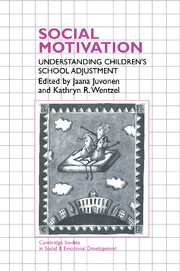Book contents
- Frontmatter
- Contents
- Contributors
- Preface
- Foreword
- 1 Introduction: New perspectives on motivation at school
- Part I Social motivation: Perspectives on self
- 2 Teacher and classmate influences on scholastic motivation, self-esteem, and level of voice in adolescents
- 3 Self-presentation tactics promoting teacher and peer approval: The function of excuses and other clever explanations
- 4 Social self-discrepancy: A theory relating peer relations problems and school maladjustment
- 5 Motivational approaches to aggression within the context of peer relationships
- 6 Motivational opportunities and obstacles associated with social responsibility and caring behavior in school contexts
- 7 Modeling and self-efficacy influences on children's development of self-regulation
- 8 Social motivation: Goals and social-cognitive processes. A comment
- Part II Social motivation: Perspectives on relationships
- Author index
- Subject index
4 - Social self-discrepancy: A theory relating peer relations problems and school maladjustment
Published online by Cambridge University Press: 22 October 2009
- Frontmatter
- Contents
- Contributors
- Preface
- Foreword
- 1 Introduction: New perspectives on motivation at school
- Part I Social motivation: Perspectives on self
- 2 Teacher and classmate influences on scholastic motivation, self-esteem, and level of voice in adolescents
- 3 Self-presentation tactics promoting teacher and peer approval: The function of excuses and other clever explanations
- 4 Social self-discrepancy: A theory relating peer relations problems and school maladjustment
- 5 Motivational approaches to aggression within the context of peer relationships
- 6 Motivational opportunities and obstacles associated with social responsibility and caring behavior in school contexts
- 7 Modeling and self-efficacy influences on children's development of self-regulation
- 8 Social motivation: Goals and social-cognitive processes. A comment
- Part II Social motivation: Perspectives on relationships
- Author index
- Subject index
Summary
A growing body of literature indicates that problematic peer relations in childhood and adolescence are predictive of both academic and behavioral problems in school (see Kohlberg, LaCrosse, & Ricks, 1972; Kupersmidt, Coie, & Dodge, 1990; Parker & Asher, 1987, for reviews). The findings from this literature have been important for the development of criteria for defining, identifying, and screening children at risk for school maladjustment. Despite the fact that the relation between problematic peer relations and school maladjustment has been replicated across samples of children from different ethnic, geographic, and developmental groups, little is known about the mechanisms by which problematic peer relations may affect school maladjustment. The development and testing of such mechanisms has been slow, in part, because the transactional relations among social, behavioral, and academic functioning over time have been difficult to study due to methodological limitations and practical constraints. It is likely that there is a bidirectional influence between peer relations and school maladjustment; however, this chapter focuses only on one side of the equation, namely, the influence of problematic peer relations on school maladjustment. In this chapter, school maladjustment is defined in terms of behavioral, emotional, or academic difficulties that may interfere with adequate functioning in school.
One mechanism that has been proposed for understanding the impact that problematic peer relations have on children's school maladjustment suggests that poor peer relations are stressful for children due to both the experienced negative affect and the accompanying lack of social support that, in turn, increases children's vulnerability to other life stressors (Armacost, 1989; Colton & Gore, 1991; see also Birch & Ladd, this volume).
- Type
- Chapter
- Information
- Social MotivationUnderstanding Children's School Adjustment, pp. 66 - 97Publisher: Cambridge University PressPrint publication year: 1996
- 7
- Cited by



